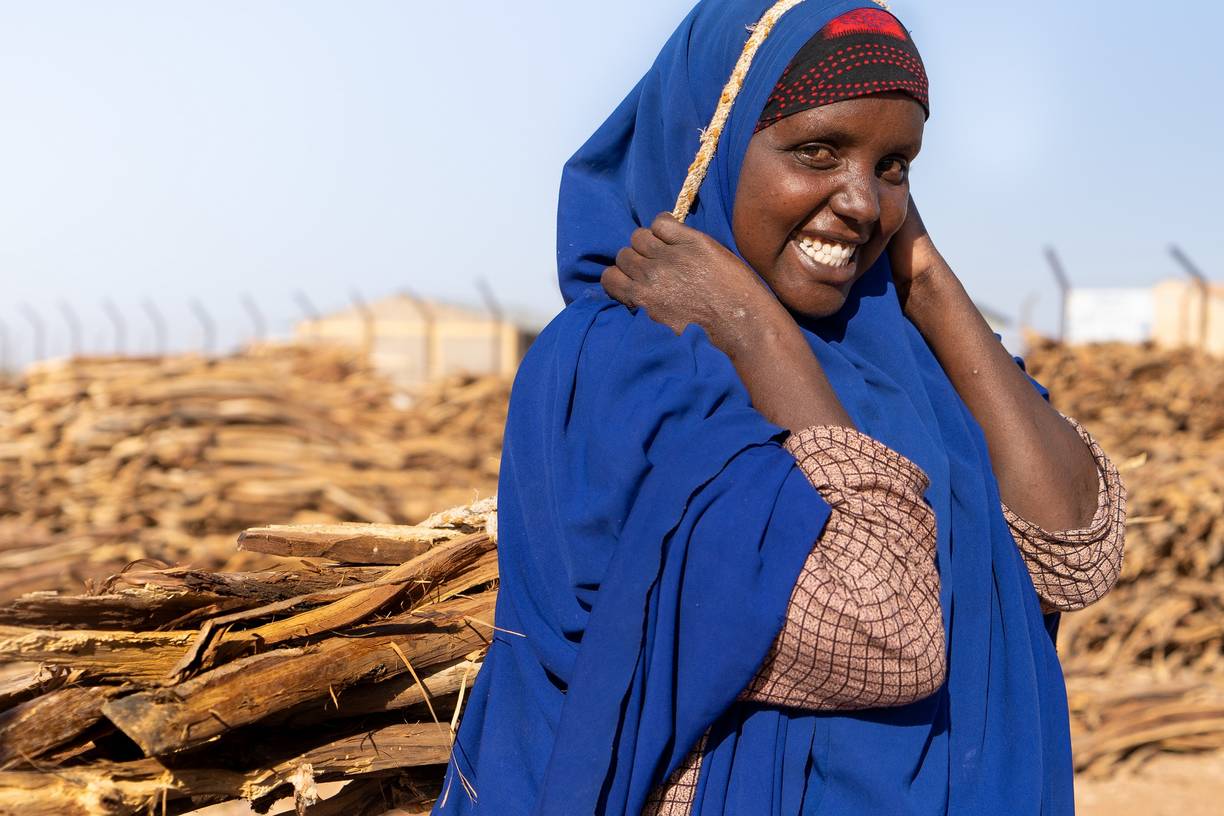Energy cooperative in Melkadia reduces protection risk, improves women’s livelihoods

Energy cooperative in Melkadia reduces protection risk, improves women’s livelihoods
UNHCR Representation in Ethiopia, 07 Mar 2019
Madow Hassan Madnur, a 36-year-old Somali refugee, is a mother of nine who lives in Melkadida camp with her husband and children. A pastoralist back in Somalia, she had to flee with her family to Ethiopia in 2011 amidst the worst drought to hit the Horn of Africa region in 60 years.
She is now the Chairwoman of her camp’s firewood and charcoal briquettes cooperative, which was set up three months ago. Even though the cooperative is new, she has seen positive changes in her life. Madow used to go to the bush to collect firewood, which she would then sell in the local market. She remembers the many problems that the practice caused her and her fellow refugee women: they had to leave their children behind without food all day, as there was no one to cook for them, or take them with them to the long and hazardous search for fuel. Sometimes, they would meet men with ill intentions lurking in the bush, which forced them to travel in groups. Competition for resources would also result in conflicts with the host community.
Now, however, her cooperative, which comprises mostly women, receives the firewood directly from another cooperative based in the town of Dollo Ado. The Dollo Ado cooperative harvests the Prosopis Juliflora trees, which have been designated as pests by the Ethiopian Government and are abundant in the area. Once the cooperative in Melkadida receives the firewood, it peels it and uses the residue to produce charcoal briquettes. It then sells the firewood and the briquettes in the market. The scheme is part of UNHCR Melkadida’s livelihoods activities and is supported by the IKEA Foundation.
Madow is content with her life in the camp, as she lives in peace and has access to basic services. She understands the key role education plays in improving lives and is determined to support her youngest daughter’s education as much as she can. At 16, her daughter is in grade six and Midow wants her to pursue her education at university level. “I need my daughter to get educated and be better than me”, she adds with a smile, before heading back to work.
Story and photo credit: UNHCR/Ariadne Kypriadi
She is now the Chairwoman of her camp’s firewood and charcoal briquettes cooperative, which was set up three months ago. Even though the cooperative is new, she has seen positive changes in her life. Madow used to go to the bush to collect firewood, which she would then sell in the local market. She remembers the many problems that the practice caused her and her fellow refugee women: they had to leave their children behind without food all day, as there was no one to cook for them, or take them with them to the long and hazardous search for fuel. Sometimes, they would meet men with ill intentions lurking in the bush, which forced them to travel in groups. Competition for resources would also result in conflicts with the host community.
Now, however, her cooperative, which comprises mostly women, receives the firewood directly from another cooperative based in the town of Dollo Ado. The Dollo Ado cooperative harvests the Prosopis Juliflora trees, which have been designated as pests by the Ethiopian Government and are abundant in the area. Once the cooperative in Melkadida receives the firewood, it peels it and uses the residue to produce charcoal briquettes. It then sells the firewood and the briquettes in the market. The scheme is part of UNHCR Melkadida’s livelihoods activities and is supported by the IKEA Foundation.
Madow is content with her life in the camp, as she lives in peace and has access to basic services. She understands the key role education plays in improving lives and is determined to support her youngest daughter’s education as much as she can. At 16, her daughter is in grade six and Midow wants her to pursue her education at university level. “I need my daughter to get educated and be better than me”, she adds with a smile, before heading back to work.
Story and photo credit: UNHCR/Ariadne Kypriadi